Y’all know I feel absolutely passionate about the importance of studying church history as believers. But did you know that church history is important (and accessible) for children as well? Today’s podcast guest, author Simonetta Carr, shares her experience writing church history biographies for both children and adults. What can we learn from these men and women of the faith? How can we grow a love of Christ’s Church in the hearts of our children and families? Check out this conversation to learn more!
Be sure to check out all the other interviews in our Homeschool Conversations series!
Watch the video. Listen to the podcast. Read the show notes. Share with your friends!

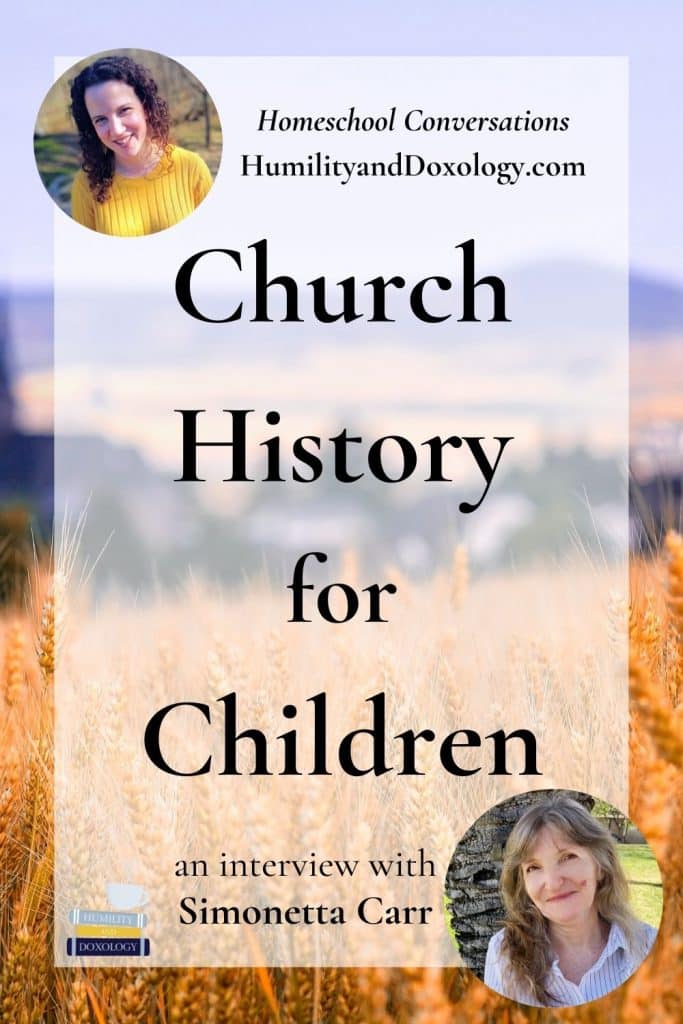
{This post contains paid links. Please see disclaimer.}
Who is Simonetta Carr?
Simonetta Carr was born in Italy and has lived and worked in different cultures. She worked for a while as an elementary school teacher and then taught her own eight children for many years. Besides writing books, she has contributed to newspapers and magazines and has translated the works of several authors from English into Italian. Presently, she lives in San Diego with her husband Thomas and their daughter.
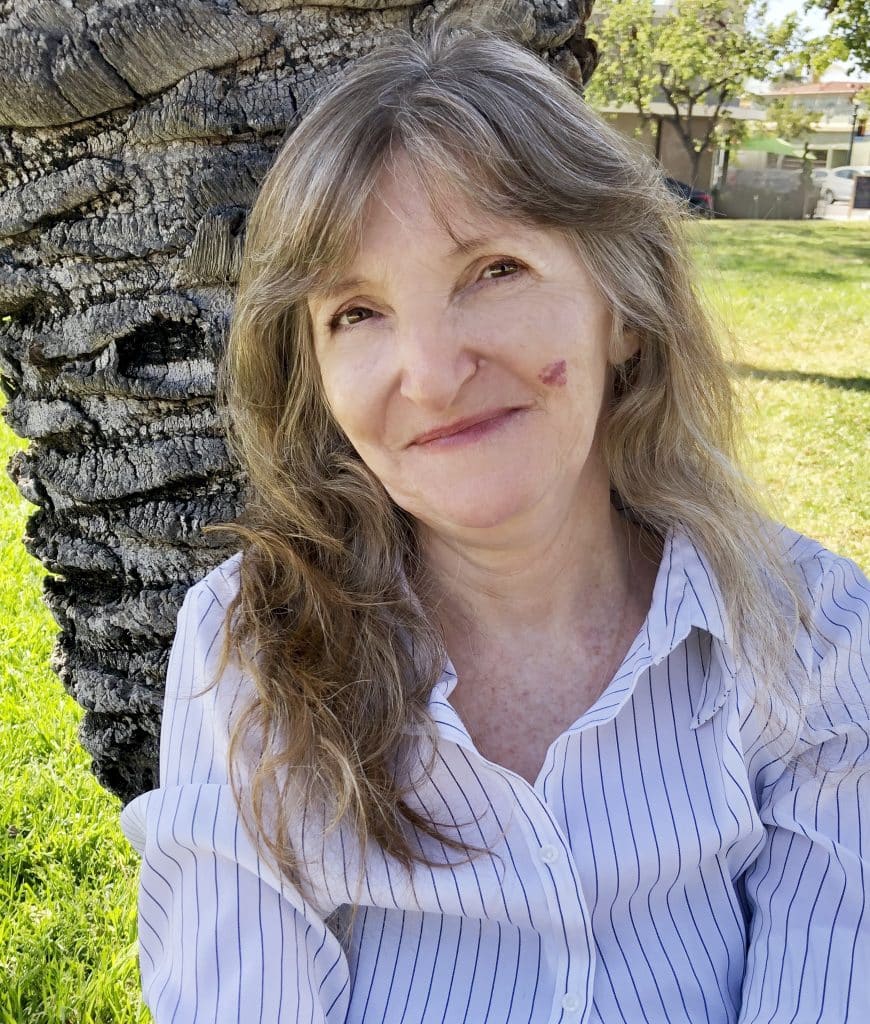
Watch my conversation with Simonetta Carr
Prefer to listen to your content? Subscribe to Homeschool Conversations on Apple podcasts or wherever you get your podcasts so you don’t miss a single episode!
Amy: Hello everyone. Today I am so excited to be joined by Simonetta Carr who was born in Italy and has lived and worked in many different cultures. She worked for a while as an elementary school teacher and then taught her own eight children for many years. Besides writing books, which I think our family probably owns at least a dozen of them, she has contributed to newspapers, magazines, and has translated the works of several authors from English into Italian. I guess like a reverse Dorothy Sayers. Presently, she lives in San Diego with her husband Thomas and their daughter.
Thank you for chatting with us today. I read your bio, but if you would tell us a little bit about yourself and your family, I would love to hear.
Simonetta Carr: Well, what you said. I was born in Italy. I left Italy in I think it was 1976, I think. A long time ago. My husband is American. First, we traveled around a bit. That’s why it says that I lived in different cultures. My husband was teaching English as a second language and it was a way for us to travel too. We lived in different countries and I had kids a little bit everywhere. We came to America in 1996 and then we stayed. We live in San Diego. It says there my kids were all grown up, even my daughter. I only have one daughter and she’s the last one and she’s with us. She’s 22 so she’s grown up too. That’s it.
I started to write around, what was it? It was around 2008 I think. I started to write books. It was for Calvin’s 500th anniversary. The book came out in 2009 If I’m not mistaken. I might be.
Amy: It’s like trying to remember the birth dates of all your children. I get them mixed up.
Simonetta: Yes.
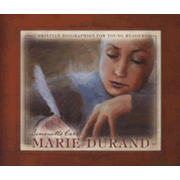 |
Marie Durand By Simonetta Carr / Reformation Heritage / Soli Deo Gloria In 1730, 19-year-old Marie Durand was arrested and taken from her home in a village in Southern France for the crime of having a brother who was a Protestant preacher. Imprisoned in the Tower of Constance, Marie would spend the next 38 years there. Simonetta Carr introduces us to the inspiring life of a woman who could have recanted her Protestant faith and gained release, but held fast to the truth—and encouraged others to do so as well. Beautiful illustrations accompany this detailed and well-told story. Recommended for ages 7 to 12 years. |
Why is church history important, and what can we learn from the biographies of men and women of the faith?
Amy: Well, one of the reasons I really wanted to chat with you is because church history is something that’s very important in my family. We love to read the stories of our church family of the past to our children. I wanted to talk to you since you’ve invested so much time in writing about church history. Why do you think it’s important for children to learn church history and what can they and we learn by reading the biographies of men and women of the faith?
Simonetta: Well, I think first thing is I don’t think church history is emphasized enough in our churches. That’s probably one reason it’s I think we need to know the history of as you said our family because in reality, it’s our family from the start.
Then also to understand why we believe what we believe right now because true, but many things have been developed throughout the centuries. It depends on the emphasis each century gave on different doctrines so we can learn a lot. Otherwise, we’d end up like they say to reinvent the wheel if we don’t learn from our past.
I don’t think I knew much about church history before. I don’t remember when, but at one point in our church there was an intern who started to teach church history for Bible studies. It was the first time I learned a lot of things that I never heard before.
I was thinking why don’t we teach this to our children? I was pretty much using the curriculum with history as the priority. You take history and you developed everything else around it.
I was teaching about history and including the history of science and art. Trying to include everything in the curriculum. I didn’t have anything for theology. Not just church history but really theology. Like how did the doctrines develop throughout the centuries? I started to do that with my kids.
Then I got the idea of starting to write books because I didn’t find them in the library. I didn’t find the books I wanted. I think a lot of books are born this way, when you don’t find what you want then you try to do it. Actually, I originally wanted this intern to write the books, and then when he didn’t do it, then I did. I don’t know if I answered your question. Maybe I answered some other question.
Amy: That’s perfect. I was just thinking about how church history reminds us where we came from but it also is guardrails. Now there’s no new error. Chances are if you think you’ve come up with some new idea, it was already dealt with at a church council. Even our young children can get excited about the stories when we’re talking about biographies because they’re like people. They realize this isn’t just something that is — not that systematic theology is boring because it isn’t either — but for a child to connect with it’s not just a list of ideas, these are real people.
I remember when my daughter was very, very little, we had been reading some of your biographies for children. We had a bunch of people coming over for a meal. I was probably running around frantic trying to prepare. Emma was like, “Well, it’s not like Lady Jane Gray. We still don’t have as many people as she had to take care of.” Sometimes they’re picking up even when we don’t realize it.
Simonetta: Yes.
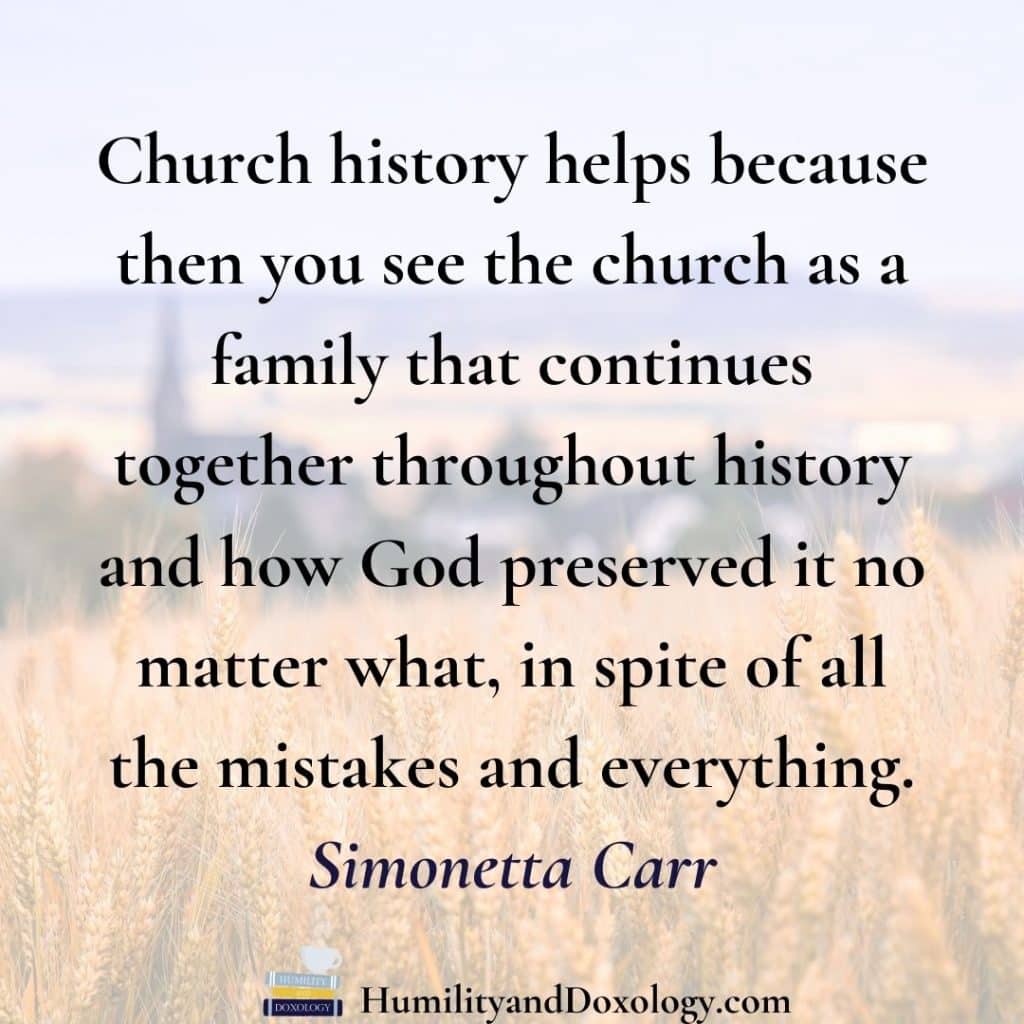
How can we learn from heroes of the faith while recognizing their sinfulness?
Amy: Well, as we read these stories to our children we’re dealing with fallen men and women because they are human, saved by grace just like we are. How can we encourage our children to admire and look up to and learn from these heroes of the faith while also dealing with their foibles, their weaknesses, and their blind spots?
Simonetta: Well, I think one way is just not to hide them. This is something I’ve seen in biographies in the past, especially for children, but surely for everybody too. There has been a tendency in the past to gloss over all the mistakes and just to emphasize what’s good. Which I understand to an extent, but if you do that all the time then eventually children will find out some of these mistakes. They’ll say you didn’t tell me the truth.
Then also I think it gives realistic expectations for our own lives because we can’t be faultless, so how come all these people in the past are so good? I just can’t be that way. It’s both comforting actually to know the other people went through the same struggles, had some similar sins, and had to fight against them. Also, it’s more realistic and helps children to say yes, there’s a good and the bad, and they understand that we are speaking honestly to them.
Amy: Yes, these people aren’t Jesus. The scripture itself you think about the great heroes of the Old Testament. Scripture doesn’t shy away from telling us the good and the bad. That leads to the next part of my question that it can be a danger when we’re reading the Bible to take these stories about men and women and turn them into just moral tales. I could see that being a potential downside or danger as we’re studying church history with our kids.
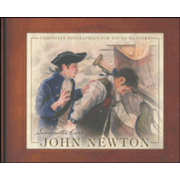 |
John Newton By Simonetta Carr / Reformation Heritage Books Discover the life of John Newton (1725-1807) with this beautifully illustrated biography. Filled with illustrations, maps, photographs, and more, this book offers a unique insight into the life and faith of hymn-writer and abolitionist John Newton. Includes a time line of his life, a “Did You Know?” section and two excerpts from Newton’s letters. 63 pages, hardcover. |
How can we keep Christ at the center of our church history studies?
How can we really keep Christ at the center of our church history studies?
Simonetta: Well, as you said, it’s related to the other question, because if you are honest about these people and you show they did this which was really good and then in this area, they did this well, then you just explain whatever they did that it was God that allowed it. It is in our lives when we do anything good, we can just thank God for it. The children can understand that, I think. It’s the same when you read Bible stories.
Amy: If He could use Balaam’s Donkey, he could use me too.
Simonetta: Yes.
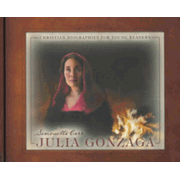 |
Julia Gonzaga By Simonetta Carr / Reformation Heritage Books Julia Gonzaga is not a well-known figure in Reformed history, but her life was full of adventure and her story is well-worth learning about! Born in 1513 to a noble family in Italy, she was married at age 13 and widowed by age 15, leaving her to manage her late husband’s wealth and estates. She survived pirate attacks and political intrigue and eventually decided to live in a monastery in Naples, where she connected with a friend, Juan de Valdes. They eventually began to converse about how Julia felt she continually put the approval of man above the approval of God – which led to their discussion of how the gospel frees us from the curse of the law. The story of her role in the stirrings of reformation in Italy provides a fascinating look into an understudied area of the Reformation! 63 pages, hardcover, with timeline and “did you know?” fact section. Ages 7-12. |
How can we encourage a love of the church in our children?
Amy: Well, besides reading books about church history, what are some other ways we can encourage a love of the church? Both the church in the past, the church in the present, and the church in the future. How can we encourage this love of the church in our children?
Simonetta: I think church history is a good way to do that.
There’s many other ways of course like going to church every week. That helps a lot.
I don’t know who your audience is, but I know for myself and my kids, being in a church, where the children are included in the service, that helps a lot because, for a while, we went to a church where they were divided. Adults went to the actual service and then the children had their own groups.
It’s so much better when they’re included, when they learn that we’re all one family, when they learn to talk to anybody, not just their own peers, but to older people and relations.
Church history helps because then you see the church as a family that continue together throughout history and how God preserved it no matter what, in spite of all the mistakes and everything. I think both of these things help.
Amy: I love hearing all the noises and the cries, and the parents saying, “Be quiet. Sit still.” [chuckles] That’s such a joy to me because it’s like we are one body. To have the children in the worship, that they know this belongs to them, it’s the same God, the same Savior. What a precious gift.
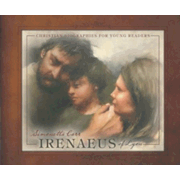 |
Irenaeus-Christian Biographies for Young Readers By Simonetta Carr / Reformation Heritage / Soli Deo Gloria Discover the life of Irenaeus of Lyon (circa 130- circa 200) with this beautifully illustrated biography. As a young man Irenaeus studied under Polycarp, spent time learning about the teachings of the Gnostics and a man named Marcion, and eventually moved to Gaul and became an elder in Lyon. After a time of intense persecution, followers were asking questions about how a good God could allow so much sin and suffering – much as Marcion’s followers had done. Since Irenaeus had studied these teachings, he wrote a series of five volumes called Against Heresies which refuted heretical teaching and codified the central tenets of what Christians believed. Includes a time line of his life, a “Did You Know?” section, and an introduction. 62 pages, hardcover.
|
How do you choose who you’re going to write about next?
Well, I would love to hear a little bit about what it’s like being an author. This is very fascinating. I’ll just start with this question. How do you choose who you’re going to write about next?
Simonetta: As I said, it started unexpectedly, because I was writing here and there, like you said in the little bio. I was writing articles. I did translations even before. I always liked to write, but I never thought I would write a book. When this intern would not write a book I wanted, I sent the proposal to a few publishers. I didn’t expect much. Every time I received a no, it was like, “Of course.” Then, one person said yes.
He was the perfect publisher. I’m still with them and they’re wonderful. They turned my books into something I never expected. I just wrote the text basically and they turned it into this amazing thing that now I have to keep up with the standards. Well, I normally find the pictures and I direct the illustrator, but I’m really happy that the books turned out really well.
It’s scary too. I’ve been writing for a long time a book on the whole church history. I normally don’t say this. I think you’re probably the first person I’m telling publicly because it’s so scary. I’m sure it has a lot of mistakes. I’m trying my best. Again, I saw a need for it. I studied and I got a lot of experts to read it. I’m sure there would still be mistakes. I’m thinking the publisher can have a few blank pages at the end so they can write the corrections. At least it’s a start. It’s scary in that sense, but it’s good. It’s good to see the children like it. I’ve always been surprised when children like my books.
I remember they’ve been translated into Indonesian too, and somebody told me in Indonesia, they’re selling so well. I didn’t understand why. They don’t understand it either because they said they don’t have all these cartoonish features that a publisher would think children will like, but then they like them anyway. For me, my life has not changed. I write and I’m surprised that people like the books, but I’m happy because of the message of what the books are trying to say.
How I decide? Well, the publisher gave me such a long list that I told them I’m going to be in my 90s writing books. That’s what they’re expecting from me. I try to keep to my original vision of sticking with theologians as much as possible because I’m taking this chance to explain. Like you were saying, to explain foundational doctrines to the children, but if you notice there, probably there’ll be maybe in one page in the whole book, there’s a doctrine. It’s pretty condensed. I spend more time probably trying to see how to word that part than all the rest.
The rest is just to help them understand that these doctrines that we believe, they didn’t just pop out of nowhere. People sat down. Some people have that picture, that image in mind of a bunch of old men sitting at a meeting and saying, “Okay, we’re going to believe this.” That’s not how things worked in church history. If you have a biography, they are books that allow me to bring up some of our doctrines.
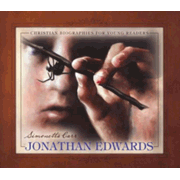 |
Jonathan Edwards By Simonetta Carr / Reformation Heritage / Soli Deo Gloria This richly illustrated book is the perfect introduction to Jonathan Edward’s life, work, and legacy. Edwards lived at a time where many people were seriously questioning long-accepted ideas about the world, life, and God, and his answers to these questions have left a mark on the way we think today. While he is often remembered as the preacher of a scary sermon about a spider dangling over a fire, he remains significant as one of the greatest thinkers American has produced. Includes a timeline and “did you know” section complete the book. |
Researching and Gathering Church History Sources
Amy: Once you have picked the person you’re going to write about, what’s the process for researching and gathering sources, I guess?
Simonetta: I pick a person, I ask the publisher to confirm and they usually say yes. Sometimes we discuss a bit because they’re also concerned about sales. If I mentioned somebody who’s completely unknown, they say, “Okay, can you sandwich it between two famous people?” I say, “Okay, I’ll do that.” [chuckles] Well, usually once I propose somebody, I have researched because then I’m convinced that they will be a good person to include. Then I start buying a bunch of books and learning more about that person.
Normally, I just write one draft fairly quickly after I know all the facts, and then I revise it throughout time. Then I send it to different people to check. Then I have to find photos, and then I have to talk to the illustrators. It’s a lot of work. Even just the illustrations. I give them some ideas, maybe this picture or this picture, and then he starts asking questions like what were they be wearing or where were the buildings like at a particular time, I don’t know. Sometimes we do the research together. Sometimes they research too, but I do some research too. It’s funny, sometimes I contact experts and I ask them all these crazy questions and they say, “I don’t know either. Nobody has ever asked those questions.” It’s fun.
Amy: It does sound fun especially the buying lots of books part. I would be really good at that part.
Simonetta: No, you should see how many I bought for the church history book.
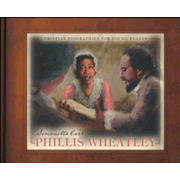 |
Phillis Wheatley By Simonetta Carr / Reformation Heritage Books |
How do you choose what biographical information to include or leave out?
Amy: I can’t even imagine, how fun. Well, you are gathering and working so hard getting all of this information, all these details, but then you’re having to figure out what you’re going to include and what you’re going to leave out because obviously, you’re writing a book for children, at the end of the day, not the work on a particular with all the information. How do you choose what information to put in and what to leave out?
Simonetta: Well, for biographies, I try to make the biographies simple for children. Besides trying to make it interesting, I’m concerned that the children will actually like it and not get bored halfway through. Yes, I try to do that.
Like I said, the doctrinal part, I choose one thing that I want to emphasize for each author, and then when I talk about that, in context, this happened and it made him think, and then this is how he came up with. I do it as concise as possible, so the story goes on and the children don’t get lost in that, but hopefully, they get it in other one small part.
It depends. There are some of the authors I wrote about that you have volumes and volumes of books. I wrote one about Spurgeon, for example, I could read about Spurgeon for a lifetime. There’s so much stuff out there by him and then there are some that you don’t know anything about.
I wrote a book of a– Who was it? Irenaeus, and I really wanted to write it. Even my publisher said, how are you find anything about him? Because we know what he said, we have one book written by him, which is awesome, and I recommend it but nothing else that I really wanted to write about him. His book against the gnostics or against Gnosticism. I shouldn’t say against the gnostics. He actually loved them. He said he loved them more than they love themselves, but yes, against Gnosticism. We still have Gnosticism around us.
That’s why I wanted to write, but I don’t know anything and there’s nothing about him, we don’t know anything. We don’t even know when he was born or when he died. We know a few things. He studied under Polycarp, and he went to Rome, and then he went to Lyon. He was pastor there for a while, he wrote the book. That’s it. Anyways, you get that book. I think it still has 64 pages. Every other book you can understand what I did for that book. I really had to come up with a lot of other stuff to include.
Amy: I think that was actually when my husband was reading aloud a few Sundays ago to my little guy. I’ll have to go and look at it more closely.
Simonetta: Yes. Look in the timeline, it’s like this long.
Amy: The rest of it you just don’t know. Well, it’s better to say we don’t know than to make stuff up, right? Well, from the time when you have picked your topic and have written your draft, you’ve done your research, you’ve revised until we actually can get the book in our hand, is there an average length of time that takes?
Simonetta: I’m not sure there is an average, but I didn’t really think about the– It’s just a few months, I think, a year the most. I don’t really remember. They go pretty fast, Reformation Heritage, compared to other publishers. They do. I send it, then we have an editor that reads it. I think a few people read it and then she makes some suggestions, sends them back to me. I send it back to her. Usually, that part doesn’t take very long. For sure, but these are short books. Then that’s it, and then they have to do the typesetting and send it to the printers. I think the longest part is writing and finding photos and working with an illustrator. Yes. It’s fun.
Amy: Yes. You mentioned that you’re working on an overview of church history. Are there any other books that you’re working on right now?
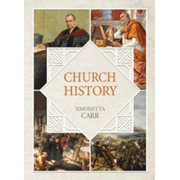 |
Church History for Young Readers, Hardcover By Simonetta Carr / Reformation Heritage / Soli Deo Gloria |
Simonetta: Yes, because that one, I’ve probably been working on it for about five years. I don’t know, it feels like I’ve been working on for 20 years.
Amy: That’s a big topic.
Simonetta: It’s a big job and hopefully, it came out okay. They really want to publish it next year. They actually wanted to publish it this year, but I told them no way, there’s no way I can finish it on time. Next year, and initially, it was supposed to be for young readers and then I think now it turned out to be more for preteens because there’s just so much in church history that if I kept it too simple I would’ve to miss too many important things so it’s more for preteens I think, but hopefully, other kids would like it too.
Then my series goes on. This time I’m trying somebody who’s really unknown here in the Western world, but at least– He was born in Nigeria, and I don’t know, I might mispronounce his name. Byang Kato, the last name Kato. I think he was the Gresham Machen of Africa. This is my definition of him. I haven’t heard anybody else given this definition.
Maybe I’m mistaken, but at a time when Africa was becoming independent and the various nations were declaring independence and they were rediscovering their Africanus and their traditions, he provided a balance, I think, by saying don’t go too far. Don’t go to the extreme of throwing the baby out with the bathwater. They were mistakes made by even missionaries didn’t always act correctly. The majority did, I think the majority of missionaries went for the right reasons and they really went for the love of Christ, but some of them didn’t behave well, or some of them didn’t make enough of their effort to include the African cultures in it.
There’s a lot that they could have done better, but you don’t throw away the gospel.

He didn’t live very long. That’s another one, he died young. There’s not much to say. I think that’s enough. I found enough to do it, and it’s amazing because I got to talk, or not that much, but to send a manuscript to his son.
Amy: Wow.
Simonetta: His son read it, so I feel better. I feel like, okay. At least I didn’t say anything wrong about his life, but yes. I’m very excited about this. I think it’s very important and it’s important for our children also to see because now the majority of Christians are in Africa and Asia. It’s important for them to be aware of this.
Amy: Yes. I think that’s something just church history in general too, it reminds us that, like you were saying, the gospel is about Jesus Christ and so there’s a distinction between a cultural outworking of the church and the church, the body of Christ. I’m a member of the Orthodox Presbyterian Church, which was founded by Gresham Machen, calling him the Gresham Machen, I’m like, “Oh, I’m going to need to get this book for sure.”
[laughter]
Simonetta: Well, that’s my impression. Yes. What you said, it’s really true because what I was saying about missionaries sometimes not behaving correctly. Sometimes they didn’t mean any harm, but besides telling people to follow the gospel, they said, “You have to dress this way and you have to sing this way and play this kind of music and do this and that.” Basically, you have to become Western in order to be a Christian.
It’s important because then of course many Africans said, “No, this is not right. We don’t have to.” Then again, like the little saying, “Don’t throw the baby out with the bathwater.” You can throw away all the Western outside what’s not important, but you have to keep the gospel the way it is. It’s an announcement that came from God. It’s not something that any man invented and you just cannot change.
Amy: Yes. Amen. Definitely. Well, you have had this wonderful opportunity to read about so many amazing men and women-
[chuckles]
He said something that really impressed me because he said, “The Gospel is something that was revealed. The Greeks didn’t have it. The Jews didn’t have it. The Americans didn’t have it. The Africans didn’t have it because it’s about the person, Jesus Christ.” That impressed me and basically, I think that’s in the nutshell, what he was teaching and he was also teaching the importance of scriptures, being faithful to scriptures.
A few of Simonetta Carr’s personal favorites
Amy: -over the years. I was wondering if you could tell us, maybe pick one man and one woman, or just one or two people that have especially struck you or that you really enjoyed learning about and tell us a little bit about them and why you were fascinated by them.
Simonetta: Yes. Well, for men, I think I mentioned already two of my favorites because usually, the last one is always my favorite, but yes. I really had a lot of fun studying about Byang Kato and Anselm. No, sorry.
Amy: Irenaeus?
Simonetta: Irenaeus was also one of my favorites because of what he wrote. I just loved what he wrote and sometimes we don’t know, but what these people wrote. It’s not as difficult to read as we imagine. It depends. It can be difficult. Actually, I can find it as difficult as other people found it because I am Italian, so we have long sentences in Italy. He has long, long sentences. Anyway, those two, Anselm was also fun to write about. I really enjoyed writing about him. Sometimes we only know little bits of pieces about these people.
Anselm, if we know anything about him, we either know him for the Why Did God Become Man? Or we know him for his struggle against the king of England. [chuckles] We don’t know everything and I found it fascinating to just see his life just how he lived. He was so down to earth and so simple. Just reading about him, I really enjoyed it and his everyday struggles.
I think on the cover, I have Anselm chasing away hunters. They wanted to kill a hare and I thought, “Oh, this is so nice. Children will like it so much.” Yes. Little funny things. Sometimes in the Middle Ages, you find a lot of funny stories. How he was with the meeting and it just a very, very important meeting and he basically just fell asleep and everybody else was trying to decide some very important things. He was just asleep. I like that part too. There’s a picture about him sleeping too.
[chuckles]
Yes, I had fun with him, but then more or less all the ones I– Every time I write about my last one is always a favorite.
For women, I don’t know in that particular series, maybe my favorite was Marie Durand, but maybe again was because I had to do so much research about her and there’s not anything out in English yet. I heard that somebody in Australia is writing something, a book about her in English with all her letters.
A friend of mine tried to do the same thing. We had a bit of problems with the copyright of the letters, so I kind of stopped, but because I did so much research about her. Whenever I do a lot of research, I get very close to the people, because you learn not just about what they did and what they wrote, but you learn about their daily lives, and their feelings, their thoughts. You get really close and I just really enjoyed it, writing about Marie Durand.
I don’t know if you know but I wrote a book about women in church history, but that’s not for children. It’s called Questions Women Asked. I had a lot of fun writing that book. It’s very short. Now the book might not be shortened, my husband was surprised. I think it’s 31 women. No idea why 31, it just happened. It goes from Marcella, I think, or is the first one and it goes all the way to, a Chinese person, Jeanette Li.
It goes from one to the other and it’s the whole scope of church history, but it’s different. It’s questions women asked so it’s all questions, different women and questions they had, either questions they had, or in some cases was questions that people asked them, but even if people asked them, then it made them think and they replied. In that book, there’s a lot of women that I felt very close. At the end, I said, “I just feel like I have 31 new friends. “
Amy: Well, they’re your sisters, right?
Simonetta: Yes. They really are.
Amy: I will have to add that to my book list. I have not read that one. I didn’t recognize that title. I love too that it’s a broader scope of all church history. I read one last year on Reformation Women, looking on my shelf, Rebecca VanDoodewaard I believe, and that brought up a lot of unfamiliar names to me, which was always fun to learn something new about.
Simonetta: This one, you are going to find a lot of unfamiliar names too.
Amy: I’m excited. Oh, that’s great. One of my favorite women from church history is Jenny Geddes. She threw a stool at the pastor who was preaching heresy. I just always love that story. I don’t know anything else about her, but she cared about–
Simonetta: I don’t think anybody knows anything more than that.
Amy: She cared about the gospel.
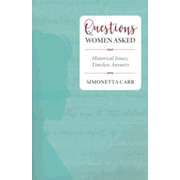 |
Questions Women Asked: Historical Issues, Timeless Answers By Simonetta Carr / Reformation Heritage Books |
Simonetta’s tips for helping the homeschool day run smoothly
Amy: Well, the final question I have for you, I know we’ve been focusing on church history and books and reading and things, but you did home-educate your eight children. One of the last questions I’m asking people is just to share their tips for helping the homeschool day run smoothly. What did you learn? As you look back on it with a little perspective.
Simonetta: As I said in my email to you, I said, “I don’t know if I can answer that question,” partially because my kids are now all grown up. Second, at my age, we look back, I don’t know if I want to share any tips.
I was talking to a couple at church just a few weeks ago and I said, “You have just so many books written by young mothers with so many tips how to raise young kids, lots of very good suggestions, there’s nothing for people our age.” The other mother said, “If we ever wrote a book, it would be a very short book that would say trust God.” Because kids grow up and you don’t know. In some cases, you see some good fruits. In some cases, it’s like, “Oh, where did my teaching go?” We are all different. People are different. God works differently in everybody’s life.
I think in your question, you said what was helping the homeschool day run smoothly, I think with us, it was more that we were pretty relaxed about it. One thing that helped me, when I was traveling, we used different books and we were in touch with different groups. When we came to America, I homeschooled my kids through the public school system because it was very convenient. I could still buy my own books and do other things. Every two weeks, I would audit what they did. They gave me a program to follow. Their program is very, very easy.
The public schools, their program is very easy compared to what we were used to. That was great for me because it’s okay, this is all they’re expecting. We actually did all the tests that we were supposed to do the work for two weeks, we did it in one day. Then they had the rest of the time just to explore what we liked. That helped me to realize– I don’t know if I’m the only one, I tend to be a perfectionist. Well, God helps me very much not to be dumb enough. I was always trying to do more, to do more with my kids. Then when I realized, “Oh, this is all they want,” then we had fun.
My kids still look back and they remember all the fun things we did, the books, we write together, we visited different places, and all the things you cannot do in a school. I think that’s what made it run smoothly. Just have fun and don’t try too hard, but I don’t know if it works for everybody. I know some parents might have different goals. Our goal was just to get them to learn, but mostly to enjoy. I wanted them to enjoy learning, because that’s something. If you enjoy learning, then you grow up and you continue to learn. If you don’t enjoy it, you can learn a lot and then it’s easy to forget. I forgot the titles of the books I just read. [chuckles]
Amy: I think so often we put so much stress on ourselves. Some school moms, like, “We’ve got to do everything right and make sure we don’t miss anything with our kids. We’ve taught them everything they need to learn.” Well, one, that’s impossible. Two, like you were saying, if we can just give them a love for learning and teach them how to learn. It doesn’t matter if they don’t actually know every single thing in the whole world, they’ll always be learning the rest of their life.
Simonetta: I think it’s the excitement. I think even if you’re a public school teacher, if you’re excited, your kids will be excited. I inherited some of this from my parents. They were both teachers. They were both very excited about what they were teaching.
My father taught math in school and then he taught me how to add and subtract and multiply when I was really young. Homeschooling was not even around then that time. We had tiles on our walls in the kitchen and he’d put little stickers on the tiles. I think it was Mickey Mouse characters or something. We do a square and he taught me how to multiply by doing that, three by four and you count the squares and I didn’t even know what that was doing but I learned that way. He was so excited if I did it right and we would just did that at the kitchen table because it was on the kitchen tiles, and I still remember that. I think what they taught me was good because I’m still learning, I still love learning.
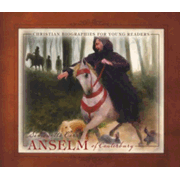 |
Anselm of Canterbury By Simonetta Carr / Reformation Heritage / Soli Deo Gloria Beautifully done, this book relays the life and accomplishments of Anselm of Canterbury. Filled with photographs of the places that Anselm lived and travelled and gorgeous paintings depicting many scenes from his life, this book is a wonderful way to introduce young readers to what life was like in medieval Western Europe. |
Find Simonetta Carr Online
Amy: Now you get to share what you’re learning with us in your books. This has been such a wonderful conversation. Thank you for chatting today. Can you tell people where they can find you around the internet?
Simonetta: Okay, well, if you go to Reformation Heritage books, you can find most of my books there. Then I have a website but it’s not updated. Maybe this will inspire me to update it. It’s simonetta-carr.com, because simonettacarr without a little dash was already taken. On Facebook with the different links.
Amy: I will have to the links to all of these things over in the show notes for this episode at www.humilityanddoxology.com. I will chat with you later. Thank you.
Simonetta: Thank you.

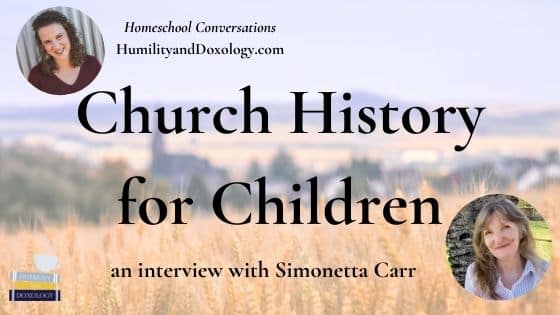
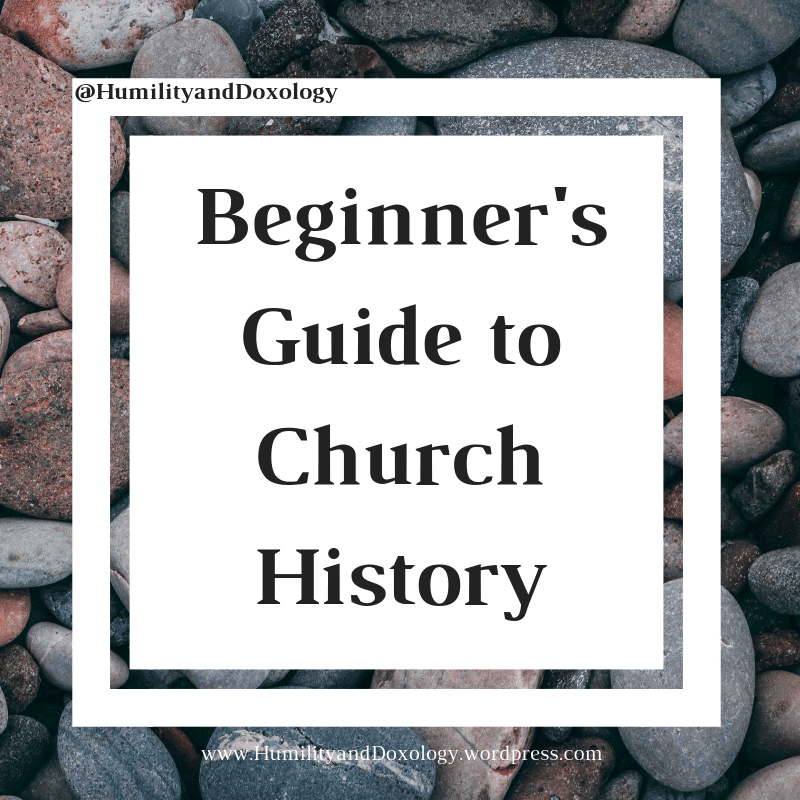





I loved this episode! What book should I try first? My 9 year old and I read quite a bit about church history and her books sound lovely.
So glad you loved it! Athanasius is one of my favorite titles to read, but you really can’t go wrong. 🙂 You can see all the books available at Reformation Heritage Books here: https://www.heritagebooks.org/brands/Carr%2C-Simonetta.html (note, it was a little wonky on my cell phone, but it looks fine on my laptop) You may also be interested in my Beginner’s Guide to Church History here: https://www.humilityanddoxology.com/beginner-guide-church-history/